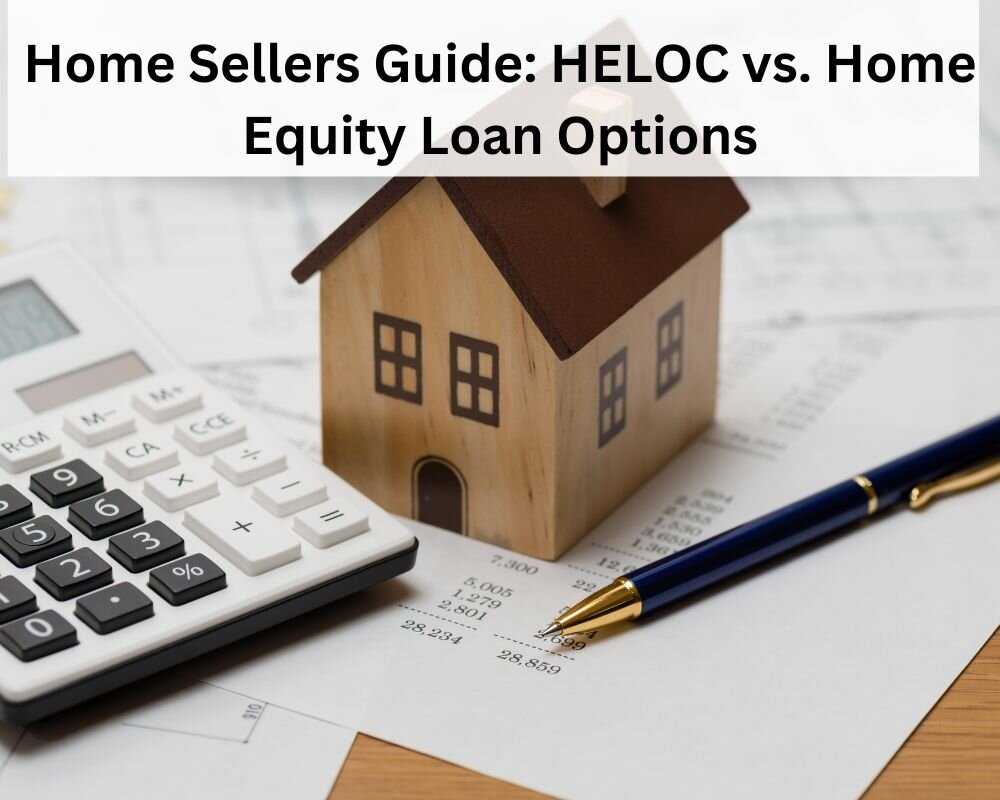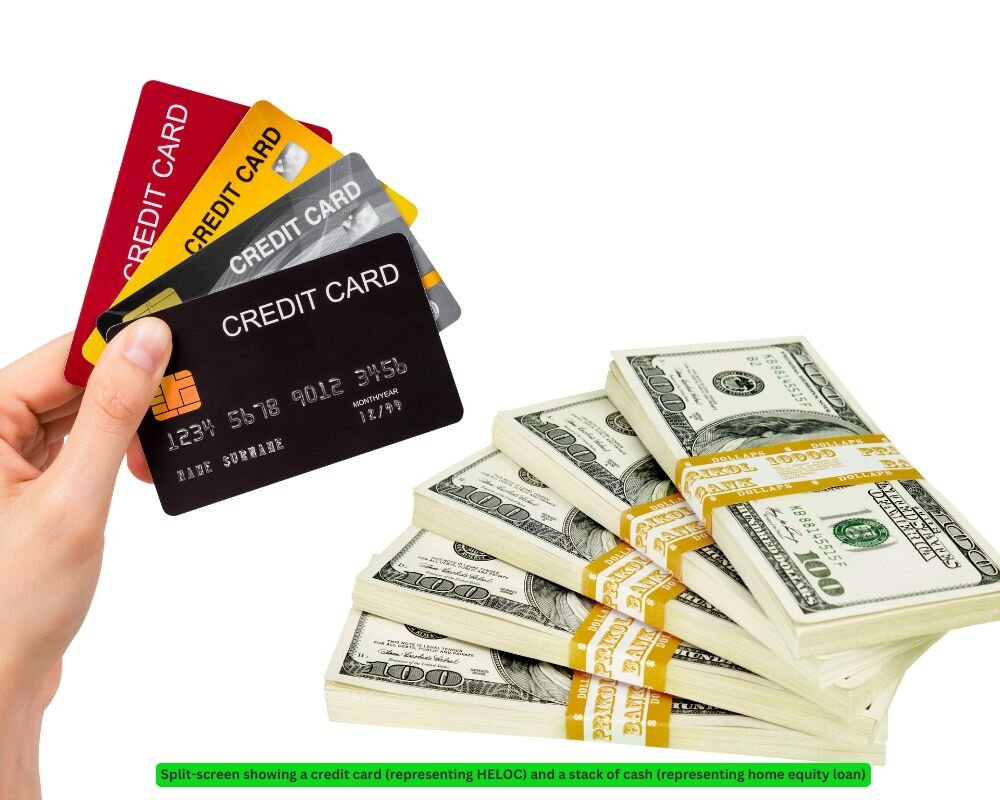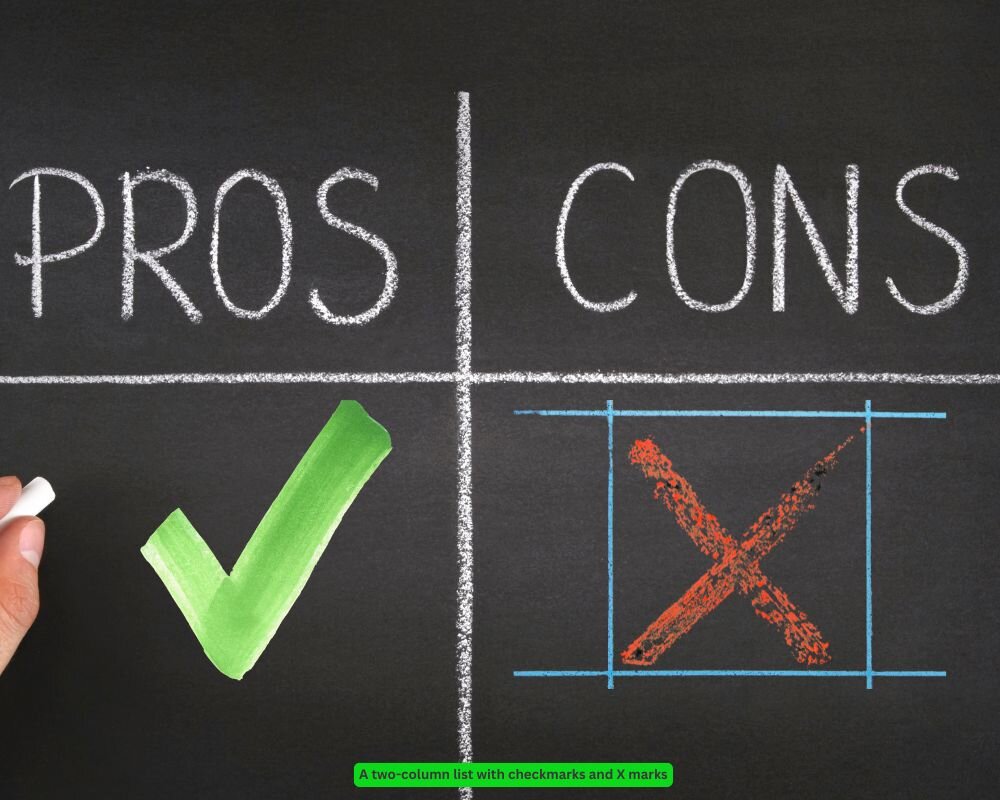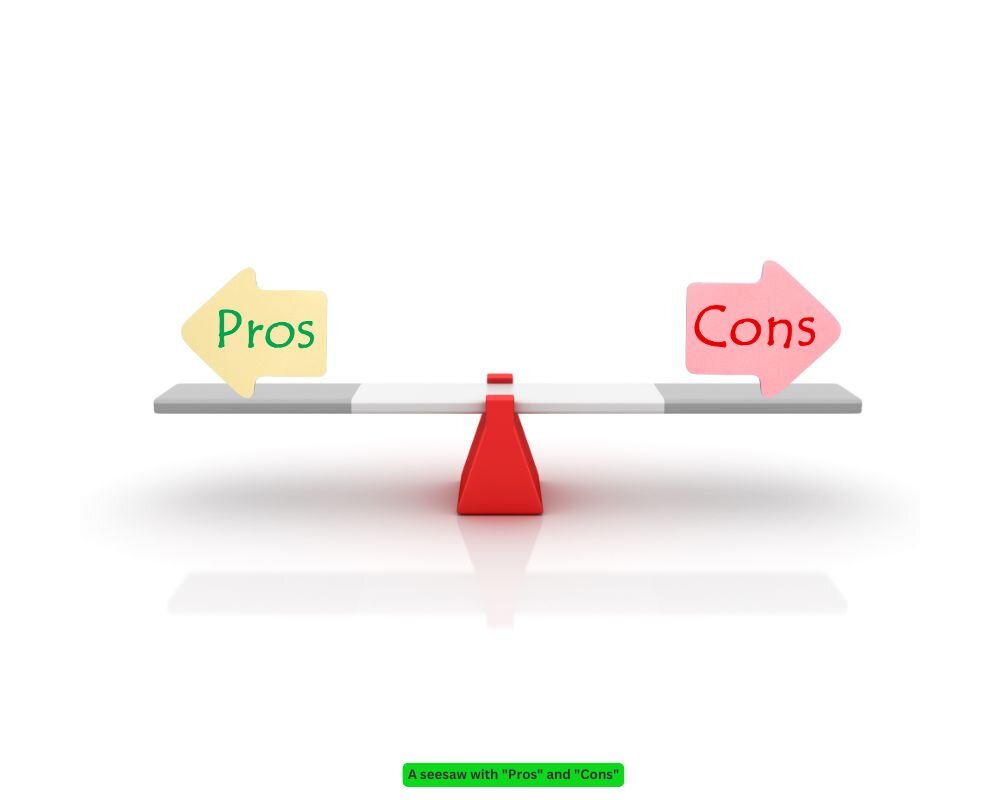
For homeowners who want money for home renovations, debt consolidation, or other financial goals, it’s important to know the difference between a home equity line of credit (HELOC) and a home equity loan. Each choice has unique features that affect home equity loan rates and terms, including the potential to use a home equity loan for student loans. This simple guide will help you choose the best option for your financial needs, including using a home equity loan to fund education through student loans or to buy a home.
Key Highlights
- Home equity loans offer a lump sum of money with a fixed interest rate, while HELOCs function like credit cards with a variable interest rate.
- Consider your financial needs, repayment capabilities, and the intended use of funds before choosing between a HELOC and a home equity loan.
- Understand factors like interest rates, fees, and repayment terms, and compare offers from multiple lenders for a home equity loan or line.
- Both HELOCs and home equity loans use your home as collateral and can have potential tax benefits.
- Explore alternative options like credit cards and personal loans if a HELOC or home equity loan doesn’t meet your needs.
Understanding HELOC and Home Equity Loans

Home equity loans and home equity lines of credit help homeowners use the value they have built in their homes. Equity is how much your home is worth now compared to what you owe on your mortgage.
A home equity loan gives you a large sum of money when you close on the loan. It works like a regular mortgage with fixed monthly payments and a fixed interest rate for a specific time, allowing you to buy a home. A home equity line of credit (HELOC) is different. It is a credit line you can borrow from during the draw period. You can take out a home equity up to your credit limit whenever you need it, but the interest rate can change. With a maximum home equity line of credit, you can receive a credit limit of up to $50,000, depending on the value of your home and the balance of your mortgage.
Defining Home Equity Loans
A home equity loan allows you to use some of your home’s value. You get a lump sum of cash when the loan closes. The amount you receive depends on your home’s equity, calculated by subtracting your current mortgage balance from the appraised value of your home. This appraised value of your home is determined by a professional appraiser, who evaluates the property and provides an estimate of its current market value. Lenders usually give this loan as a percentage of your home’s value, which is often about 80%-85%.
Home equity loans, also known as installment loans, are similar to traditional mortgages. You get all the loan money at once and then pay back a fixed amount each month. This includes both the principal and interest over a set repayment period, making it a one-time installment loan. This period can be between 5 and 30 years. One big plus is that home equity loans often have a fixed interest rate. This makes it easier to plan your budget because you know your payments for the whole life of the loan.
Keep in mind, that you cannot borrow more money after getting the loan without refinancing. Also, if you do not pay back the home equity loan, it could lead to foreclosure. So, it’s important to think about your financial situation carefully before taking on this loan.
Exploring HELOC (Home Equity Line of Credit)
A Home Equity Line of Credit (HELOC) gives you a flexible way to borrow money using the equity in your home. It works like a credit card, allowing you to access a credit line that you can use as needed during the draw period. HELOCs usually have variable interest rates, which change based on the prime rate. You can use this money for many things, including achieving your life priorities such as home improvements, debt consolidation, or making large purchases. Additionally, there is a chance that interest payments on your mortgage loan could be tax-deductible. By understanding the terms and options, you can access your home equity through a HELOC and achieve your life priorities.
Key Factors to Consider Before Choosing

Understanding what you need and your money goals is very important when choosing between a HELOC and a home equity loan. Here are some key points to think about regarding your home value and equity: equity is the difference between your home’s market value and what you owe on your mortgage.
- Do you need a large amount of cash at once for a specific project?
- Or do you want continuous access to funds?
Next, think about how comfortable you are with changing interest rates. A home equity loan with a fixed rate offers consistent payments. On the other hand, a variable-rate HELOC may lead to changing monthly payments.
Evaluating Your Financial Needs
Carefully think about how you plan to use the money when choosing between a HELOC and a home equity loan. If you have a large, one-time cost, like fixing up your home or paying off debt, a home equity loan could work well. The fixed interest rate means your monthly payments will be the same, making it easier to budget.
On the other hand, if you expect ongoing costs, like home improvements or education expenses, a HELOC might be better. It gives you the freedom to borrow money, pay it back, and borrow again. This is useful for projects that take a long time to finish, such as home repairs that can increase the market value of your home.
No matter which option you choose, check your budget and find a monthly payment that feels comfortable. It’s also important to think about possible interest rate increases with HELOCs. Lastly, keep in mind that if you can’t pay back either loan, you risk losing your home.
Considering Your Long-Term Financial Goals
Aligning your choice with your long-term money goals and understanding your home value is very important. For example, are you saving for a big purchase, like a down payment on a new home, and looking for a steady repayment plan? If so, a home equity loan with a fixed interest rate and the option for automatic payments from a U.S. Bank checking or savings account may be the best choice for you. Additionally, setting up automatic payments can help you stay on track with your loan and ensure timely payments.
On the other hand, if you are planning for your child’s higher education and think you will need funds for several years, a HELOC might allow you to borrow against the equity in your home. Its flexibility during the draw period can help you manage tuition payments by using the equity in your home as you need it.
In the end, the best choice depends on your situation. Think carefully about how comfortable you are with changing interest rates, how urgent your financial needs are, and how either option fits into your overall saving and investment plans.
The Pros and Cons of HELOC

HELOCs are flexible. This makes them good for big buys or ongoing costs. They usually have lower starting interest rates than credit cards. Sometimes, the interest you pay can also be tax-deductible for certain reasons. But HELOCs have risks.
The variable interest rate on many HELOCs means your monthly payments can change. This can make it hard to budget for your mortgage payment, particularly if you have much equity tied up in your home. If you misuse them during the draw period, you might end up with more debt. If you fail to make payments, you could face foreclosure.
Advantages of Choosing a HELOC
HELOCs can be a smart choice for homeowners. They offer flexible ways to get funds. Here are some benefits of using home equity.
- Flexibility: HELOCs work like credit cards. You can borrow what you need, when you need it, up to your credit limit. This is helpful for projects that might change in cost, especially when using home equity as collateral.
- Lower Starting Interest Rates: HELOCs often have lower interest rates than personal loans or credit cards, making them a wise choice for accessing much equity. This is appealing, especially during the draw period when your focus is mainly on paying interest.
- Possible Tax Benefits: The interest on a HELOC could be tax-deductible if you use it for approved home improvements. Always talk to a tax advisor to see if this applies to you.
Keep in mind that HELOC interest rates are mostly variable and linked to the prime rate. So, your rates and payments can go up over time, affecting your budget.
Drawbacks of Opting for a HELOC
HELOCs, which offer benefits like flexibility and possible tax savings, also come with some downsides:
- Variable Interest Rates: These rates can change, which means your monthly payments might go up over time. This can make it hard to budget.
- Temptation to Overspend: Since HELOCs work like credit cards with revolving credit, borrowers might feel tempted to spend more, which can lead to debt.
- Potential for Higher Costs Over Time: If the prime rate rises a lot, your variable interest rate on the HELOC will increase too, affecting your ability to access your home equity. This can result in higher costs to borrow money than you planned for.
Think carefully about these drawbacks and how they fit with your money goals and ability to take risks. Make sure you can handle changing monthly payments and steer clear of debt traps. If you are thinking about getting a HELOC, keep a good credit history and compare different lenders to find the best terms, as this equity loan is a second mortgage.
The Advantages and Disadvantages of Home Equity Loans

Home equity loans give borrowers a one-time, fixed amount of money. This is perfect for certain projects, like a major renovation or consolidating debt using your home equity. The fixed-rate makes it easier to plan and track monthly payments.
However, unlike HELOCs, home equity loans don’t allow you to take out more money after you receive your loan amount. To get more funds, you’ll need to apply for a new loan or line of credit. Also, if interest rates go down, you might not save money unless you decide to refinance.
Benefits of Home Equity Loans for Homeowners
Home equity loans can be a good way to get money if you use them wisely for planned expenses. Here are some benefits to consider:
- Predictable Payments: With fixed interest rates, your monthly payments stay the same for the loan’s term. This helps you budget better.
- Lump-Sum Disbursement: You get the loan amount all at once. This is great for big expenses like home renovations or debt consolidation.
- Potential Tax Advantages: The interest you pay on a home equity loan could be tax-deductible if you use the money for significant home improvements. It’s best to talk to a tax advisor to learn about the latest IRS rules.
But keep in mind there are some drawbacks. Once the loan amount is set, getting more money will need a new loan application. Plus, if interest rates go down, you won’t get the lower rates unless you choose to refinance.
Potential Downsides of Home Equity Loans
It is important to know about the possible drawbacks:
- Limited Borrowing Power: Once your loan amount is decided, if you need more money, you have to apply again. This may come with extra fees and closing costs.
- Missed Opportunities for Lower Rates: If interest rates drop, you probably won’t take advantage of these lower rates unless you refinance. But refinancing also has costs and factors to think about.
- Closing Costs & Fees: Like regular mortgages, home equity loans include closing costs. This can have appraisal fees, title insurance, and origination fees that affect the balance of your loan.
Keep in mind that a home equity loan is like a second mortgage, meaning you’ll have two loans based on your home. If you don’t pay either loan, you could lose your home. It’s important to carefully look at your financial situation. Make sure you fully understand the terms and effects before making this decision.
HELOC Loan Rates and What You Need to Know
HELOC loan rates are very important when it comes to how much you pay to borrow money against the equity in the home. Unlike home equity loans that mostly have fixed rates, HELOCs often come with variable rates. It is important to understand how HELOC rates work and how they affect your money.
Lenders set HELOC rates based on many factors. These include current market interest rates, your credit score, your debt-to-income ratio, and the amount of money you want to borrow. It is important to shop around for the best HELOC rates. You should compare offers from banks, credit unions, and online lenders to find the best deal and loan details, such as repayment terms and fees.
Understanding Current HELOC Rates
HELOC rates fluctuate based on market conditions, making it essential to stay informed about current trends. Many factors can affect these rates, including Federal Reserve decisions on interest rates, inflation levels, and overall economic conditions.
To get a general idea of prevailing HELOC rates, you can refer to financial publications such as The Wall Street Journal, Bankrate, or NerdWallet, which often discuss different types of loans. These sources provide average rate ranges, giving you a starting point for comparison.
| Source | Rate Range | Date |
| Bankrate | 7.50% – 9.00% | August 2024 |
| The Wall Street Journal | 7.75% – 9.25% | August 2024 |
| NerdWallet | 7.25% – 8.75% | August 2024 |
Remember, these are just averages. Your actual rate depends on individual factors like your credit score and loan terms. Always check with various lenders for personalized quotes and compare offers before making a decision. Don’t forget to inquire about potential rate discounts, such as those for autopay from a linked checking account, which can reduce your overall borrowing costs and keep you updated on the most current date rates. Understanding current HELOC rates is crucial in making an informed decision for your home equity loan options.
How Rates Affect Your Borrowing Cost
The interest rate you get on your HELOC affects how much you will pay to borrow money. If the interest rate is high, you will pay more. If it is low, you can save a lot of money over the life of the loan.
It is important to know the difference between the interest rate and the annual percentage rate (APR) when looking at loan offers. The interest rate shows the cost of borrowing money. The APR gives you a bigger picture. It includes the interest rate plus other fees related to the loan.
When you compare APRs from different lenders, you can find a better deal. The APR shows the total cost of the loan payment, not just the interest. Even small changes in the interest rate can lead to big savings later, especially when considering the market value of your home. So, make sure to compare offers before you decide.
How to Apply for HELOC or Home Equity Loans
Applying for a HELOC or a home equity loan has several steps. It usually starts with checking your creditworthiness. Lenders look at factors like your credit score, credit history, debt-to-income ratio, and the amount of equity in your home. This helps them decide if you can get a home equity loan based on your financial situation.
Before you apply, get all the needed documents. You will need proof of income, mortgage statements, and recent tax returns to calculate your home equity.
After you have everything ready, send applications to different lenders. This way, you can compare their offers and see how much equity you can use. Get ready for a credit check, which may lower your credit score for a short time.
Make sure to look over each lender’s loan terms, closing costs, and interest rates. This will help you find the best option for your situation.
Preparing Your Application
Before you apply for a HELOC or home equity loan, follow these steps to boost your chances of getting approved and getting good terms:
- Check Your Credit: Get a free copy of your credit report from the three big credit bureaus: Experian, Equifax, and TransUnion to ensure you qualify for the best home equity loan. Look for mistakes and fix them to ensure your credit report reflects the true market value of your home. This could help raise your credit score and get you better loan terms.
- Gather Financial Documents: Lenders want to see proof of your income, job history, debts, and homeownership. You might need documents like W-2s, recent pay stubs, tax returns, bank statements, and your current mortgage statement.
- Shop around and compare offers for the best home equity loan. Different lenders have various loan programs, interest rates, and application fees. It’s important to look for the best rates and terms. Get quotes from multiple sources, like banks, credit unions, and online lenders.
Necessary Documentation and Approval Process
Securing a HELOC or home equity loan depends a lot on how strong your application is. Each lender has different requirements for a mortgage loan, but here are the common documents you usually need:
- Proof of Identity: You will likely need a valid driver’s license, passport, or state-issued ID.
- Income Verification: Lenders often ask for recent pay stubs, W-2 forms, or tax returns to check your income and job history.
- Homeownership Documentation: Be ready to provide your mortgage statement, property tax bills, and homeowner’s insurance policy to prove you own the home and have insurance.
After you send your application and documents, the lender will look over your financial history. This includes your debts like credit cards and any current loans. They might also get an appraisal to see how much your home is worth. The approval process can take different amounts of time. Some lenders give quick answers, while others can take weeks. If you get approved, you’ll receive a loan estimate. This will include details about the interest rate, closing costs, and other terms of the loan.
The Bottom Line
In conclusion, it’s important to know the differences between a HELOC and a Home Equity Loan. This knowledge helps you make smart financial choices as a homeowner. Think about your financial needs and long-term goals before deciding which option is best for you. Look at the pros and cons of both loans to see what fits your needs, especially when considering if an equity loan is a second mortgage. Whether you choose a HELOC or a Home Equity Loan, it’s key to understand the rates and the application process. If you’re looking for an easy way to sell your home, Click Cash Home Buyers offers a simple solution that is worth considering. Make sure to collect all necessary information and documents before you decide. If you have any questions or thoughts, please share them in the comments below.
Home Equity Unveiled: HELOC vs. Home Equity Loans vs. Selling Your House for Cash
Struggling with home equity decisions? There’s another option you might not have considered. Instead of navigating complex HELOC or home equity loan processes, why not sell your house quickly and easily by clicking Cash Home Buyers? We offer a straightforward alternative that puts cash in your hands without the need for credit checks, appraisals, or lengthy approval processes.
By selling to us, you can:
• Access your home’s full equity without borrowing
• Avoid interest rates, closing costs, and long-term debt
• Get cash fast without the risks of using your home as collateral
• Sidestep the complexities of HELOCs and home equity loans
Don’t let financial hurdles hold you back. If you need to tap into your home’s value quickly and hassle-free, Click Cash Home Buyers is here to help. Contact us today for a no-obligation cash offer and discover how selling your house can be a simple solution to your financial needs. Call 209-691-0102 or visit our website to learn more about how we can help you unlock your home’s value on your terms.
Frequently Asked Questions

What Determines My Eligibility for a HELOC or Home Equity Loan?
Lenders decide if you’re eligible based on a few important factors. These include your credit score, FICO score, the equity in your home, your income, and your debt-to-income ratio (DTI). Having a good credit history and a low DTI usually improves your chances of getting approved.
Can I Deduct Interest Paid on a HELOC or Home Equity Loan?
Under the current IRS rules, if you use the loan amount from a HELOC or home equity loan to buy, build, or significantly improve your home, the interest you pay might be tax-deductible. It’s a good idea to talk to a tax advisor for advice based on your unique situation.
How Quickly Can I Access Funds from a HELOC or Home Equity Loan?
HELOCs can help you get money fast during the draw period, allowing you to use home equity as needed. However, the time it takes for loan disbursement can be different depending on the lender. Usually, it might take a few weeks to finish the process.
What Happens if I Sell My House with a HELOC or Home Equity Loan?
When you sell your house and still owe money on a home equity loan or HELOC, you must pay off that loan first using the money from the sale. Only after that will you get the rest of the money from the sale. This helps you meet your mortgage payment responsibility.
Are There Alternatives to HELOC and Home Equity Loans?
Yes, your choice can depend on your financial situation and what you need. Other options instead of HELOCs and home equity loans are personal loans and some types of lines of credit. Refinancing options can also be considered. Remember, these options can come with different interest rates and terms. Also, they may not be secured by the equity in your home.

Contact Us
We would love to hear from you! Please fill out this form and we will get in touch with you shortly.

